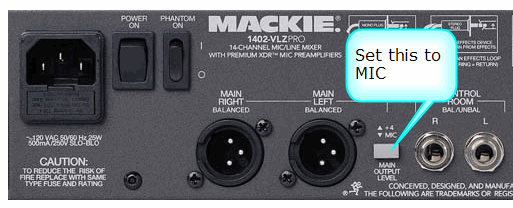Mixer Outline Template
:Mixer
Contents
Outputs
XLR Balanced +4 The nominal output of the XLR Balanced Outputs is too high for the XLR inputs on the PS1 Power Stand Channels 1 and 2. If you want to use balanced cables from the Mixer to Channels 1/2 on the L1 Classic or L1 Model I you may need to use a Pad to lower the signal level from the mixer.
{{#Click:Pad|Image:Pad.jpg|Attenuation Pad}}
XLR Balanced with built-in-pad If the Mixer has a button, switch or adjustment that allows you to attenuate (turn down) the output of the balanced XLR main outs, try the setting with the lower output.
Here is an example (Mackie 1402 VLZ)
Otherwise you may need to use a Pad for each output channel.
&frac1/4 Inch with suitable output for PS1 Powerstand Channel 1 or 2 inputs You can use TS (Tip Sleeve) unbalanced cables, or TRS (Tip Ring Sleeve) balanced cables, but since the ¼ inch phone connections at the Bose Classic and Model I Power Stand are unbalanced there is no particular benefit using balanced cables.
¼ Inch Tip-Sleeve (unbalanced) to ¼ Inch Tip-Sleeve (unbalanced)
This should work fine.
¼ Inch Tip-Ring-Sleeve (balanced) to ¼ Inch Tip-Sleeve (unbalanced)
This should work fine.
¼ Inch Tip-Ring-Sleeve (balanced) to ¼ Inch Tip-Ring-Sleeve (balanced)
This should also work, but likely no better than a simple ¼ Inch Tip-Sleeve to Tip-Sleeve cable. This is because the ¼ Inch input on the Bose System is Tip-Sleeve (unbalanced) anyway.
Links:
- [ Manual]
- Image of connections
- Image of connections
More Notes

